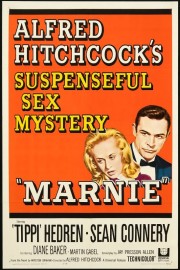Marnie
Alfred Hitchcock was a director known for exploring the same themes in many of his greatest films. First among those was the idea of an innocent man, wrongly accused of a crime, like in his 1959 classic, “North by Northwest.” Less obvious when one first watches his films, but clearer the more times we see them, is the ways in which men abuse women, taking a psychological toll, ultimately, on both. The abuse isn’t physical, however, but emotional, and it’s an idea Hitchcock explored in three of his finest films. The clearest example was his 1958 masterpiece, “Vertigo,” where Jimmy Stewart’s damaged ex-cop makes over Kim Novak to look like the woman he loved, and allowed to die. Less obvious the first time around is his 1940 Oscar winner, “Rebecca,” in which Joan Fontaine marries the caring Sir Lawrence Olivier, but is forever in the shadow of Olivier’s suicidal previous wife, leading to the self destruction of both.
More obvious, especially only six years after “Vertigo,” was the film “Marnie,” which seems to look at similar ideas as the earlier film, but in fact finds fresh terrain neither “Vertigo” nor “Rebecca” explore. Like “Rebecca” and “Vertigo,” the film is “officially” adapted from a novel (in this case, one written by Winston Graham), but the screenplay (by Jay Presson Allen) and story are completely infused by the man in the director’s chair. In fact, an early complaint of “Marnie” at the time was it’s obvious similarities to “Vertigo” (especially true in Robert Burks’s cinematography and Bernard Herrmann’s lovely score), but now, the similarities feel more cosmetic, even if the feelings we experience are comparable.
“Marnie” stars Tippi Hedren as the title character, a woman with deep-seeded fears of men, thunder, and the color red, as well as a penchant for taking well off men’s money in a less-than-legal manner. She returns home to Baltimore after her latest thieving, where she lives with her mother (Louise Latham), who senses something not quite right, and finds a temp job at the office of a suave Philadelphia playboy named Rutland (Sean Connery, utilizing that Bond charm intelligently). Shortly after starting, she comes in for a Saturday day with Rutland where some of Marnie’s fears become obvious to Rutland, and the two become intimately involved. It isn’t long before all their respective cards are on the table, and despite all that, they get married, which will unlock the unhappy details of Marnie’s life.
Marnie, like the women in “Vertigo” and “Rebecca,” is put through the emotional ringer in this film, but if one watches closely, we see how sympathetic Hitchcock feels towards these women. The men in these films are broken, selfish people. The reasons they do what they do in these movies are for their own purposes and motives, rather than the happiness of the women. On the surface, “Vertigo” feels like the cruelest film on this front, but “Marnie”– made at a time when the boundaries of what could be shown in movies was breaking down –is the worst, and it’s because of a moment where Rutland, unable to control himself, takes Marnie, who has been frigid to him their entire honeymoon. Rutland’s actions lead to the most devastating revelations in any Hitchcock film, and it’s clear just how much sympathy Hitchcock has for his female characters, even if he sometimes treated the actresses playing them cruelly. And like Joan Fontaine in “Rebecca” and Kim Novak in “Vertigo,” Tippi Hedren thrives under Hitch’s direction, giving an emotional, fragile performance that also manages to be entertaining. And Hedren is matched every step of the way by Connery, who twists his emerging Bond persona into uncomfortable shapes that make it difficult for us to like him, but makes when he comes to really care for Marnie all the more heroic in that old school movie way that Cary Grant and Jimmy Stewart perfected under Hitchcock’s watchful eye.
With “Vertigo,” Hitchcock began to play around more with the way he told his stories. He started to become more daring, doing things few filmmakers would imagine. He let the audience in on a major secret in “Vertigo,” and killed off his heroine in “Psycho,” along with other little inspirations. “Marnie” has moments like that, and even if they aren’t quite so dramatic as those two, they’re so well delivered that they have an impact that’s just as vital as what those two films accomplished. “Marnie,” in the end, is second tier Hitchcock mastery, but as anyone who’s seen enough of his films knows, that’s still better than a lot of director’s top tiers of cinema, which is why no one else has matched him as the medium’s greatest filmmaker.










